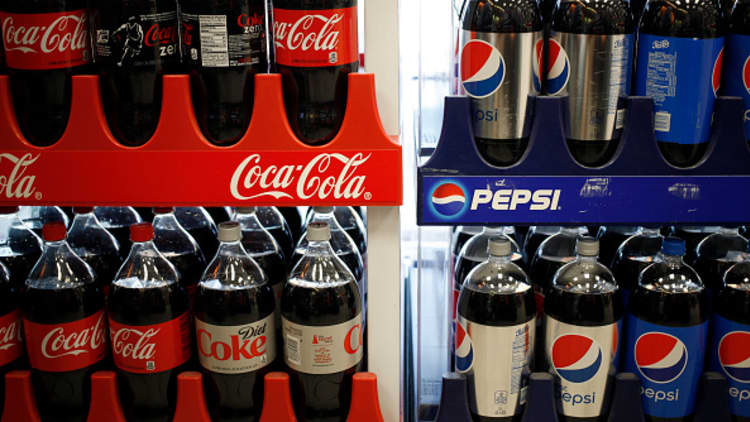
Coca-Cola beat analysts' expectations on the top and bottom lines on Friday, as bets on new launches like Coke Zero helped counter shifts away from its core beverages.
Here's how the company did compared with expectations in a survey of analysts by Thomson Reuters:
- EPS: 39 cents vs. the expected 38 cents.
- Revenue: $7.51 billion vs. $7.37 billion.
- Organic sales growth: 6 percent vs. 3.65 percent.
Coca-Cola's net revenue declined 20 percent for the quarter. The company attributed that to headwinds from its efforts to refranchise its bottling operations. Organic sales, which excludes the the impacts of those efforts along with other changes, were up 6 percent for the quarter.
Earnings in the latest period were hurt by a $3.6 billion one-time charge related to new U.S. tax laws. The company reported adjusted earnings 39 cents per share, topping analysts' estimates by a penny a share.
Shares of the beverage giant were up fractionally in morning trading Friday.
As with last quarter, beverage volume growth stayed even. The company offset its flat volume by raising prices and selling more of its expensive products.
For the year, Coke reported net sales of $35.4 billion, a 15 percent drop from last year.
Its strongest performing beverages were sports drinks and water. Water sales, including Dasani, grew 2 percent for the quarter, as did coffee and tea beverages, such as Honest Tea. Carbonated soft drinks stayed flat and its juice, dairy, and plant-based beverages declined 2 percent.
"Coca-Cola continues to do a good job driving relevancy with consumers and leveraging innovation and mix to drive solid pricing growth," said Bonnie Herzog an analyst with Wells Fargo, though she added that flat volume growth "remains a concern."
Coca-Cola is coming off a strong fiscal third quarter in which it battled shrinking a market for its core products with new products like Coke Zero, which it can price higher than its staples. This January, it continued its innovation push, launching four new flavors of Diet Coke.
Reviving Diet Coke will be a continued focus for 2018, the company said.
"Clearly, we would love to at least stop declining, if not get into growth. I'm not sure just the flavors and the packages will get us there, but it's certainly going to be a good step in the right direction," a company representative told analysts in its earnings call, according to FactSet.
The conditions in which Coke will pursue this objective are getting worse. The retail landscape has become increasingly challenged and Coca-Cola's archrival PepsiCo continues to see soda sales decline.
On Thursday, Coca-Cola said it boosted its annual dividend by 5.4 percent to $1.56 a share from $1.48 a share in 2017. It also announced two new nominees to its board, Christopher Davis, chairman of Davis Advisors, and Caroline Tsay, CEO of Compute Software.


